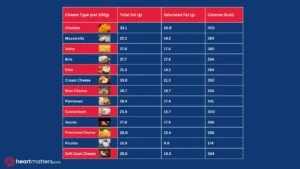For decades, eggs have shouldered the blame as a primary dietary culprit for high blood cholesterol and increased risk of heart disease. However, despite their cholesterol content, research suggests that eggs typically do not significantly raise blood cholesterol levels or cardiovascular risk for most individuals. Instead, another beloved food may quietly contribute to cholesterol-related issues—cheese.
Emerging evidence points to excess saturated fat contributing to imbalanced blood lipid levels, often originating from less suspected sources like cheese and more obvious ones like red meat and butter. Therefore, evaluating your cheese consumption habits is crucial before eliminating omelets from your diet. Striking a balance allows for the continued enjoyment of eggs and moderate cheese intake while promoting heart health.
Eggs Redeemed while Cheese Implicated
Nutritional science is continuously evolving. Early research, which did not fully consider the nuanced interactions among genetics, individual metabolic variations, and overall dietary patterns, persistently linked egg consumption with increased blood cholesterol and cardiac risk. However, more recent and rigorous studies, with better control of variables, have found a negligible correlation between eggs and negative cardiovascular outcomes for most populations. Balance and moderation are key. Eggs are a nutritional powerhouse, offering a broad amino acid profile and essential fats, making them one of the most nutrient-dense foods.
By contrast, saturated and trans fats directly contribute to dysregulated blood lipids, plaque accumulation in arteries, and poorer cardiovascular risk parameters. While eggs and many cheeses contain saturated fat, cheese often delivers higher proportions than serving sizes. Unlike eggs, cheese lacks counterbalancing antioxidants, vitamins, or minerals. Over time, consuming excessive amounts of high-calorie and saturated-fat cheese can negatively impact blood lipid values. Additionally, many popular cheeses are high in calories, further compounding their potential impact on health and maintaining optimal weight.
The impact of cheese on health is amplified when it is used to enhance meals that already contain high-fat ingredients like red meat. Additionally, the higher sodium levels in many cheeses can promote fluid retention and elevate blood pressure in sodium-sensitive individuals. While cheese can be enjoyed as part of a balanced diet, it is important to consume it in moderation. Incorporating a variety of dairy products, such as yogurt, milk, and eggs, rather than relying primarily on cheese, helps to manage intake of saturated fat, calories, and sodium.
Moderation and variety are key to maintaining heart health while still enjoying the flavors that cheese brings to meals.
Cheese Benefits Need Not Get Curdled
When consumed in moderation, cheese and other dairy products make positive diet additions, supplying key nutrients like protein, calcium, vitamin D, and important bioactive compounds.
These benefits likely stem from particular protective compounds abundant in cheese and other dairy foods. Conjugated linoleic acid (CLA) in cheeses boasts anti-inflammatory effects, lowering chronic inflammation damages over time. Additionally, specific fatty acids, including butyrate and propionate, regulate immune functions while facilitating hormone balances that manage appetite and weight – critical factors influencing many chronic diseases. Lastly, vitamins D, K, and A support bone integrity and healthy cellular aging biologically.
So, rather than prohibiting cheese, ensure sensible incorporation into an overall balanced diet for optimal health. Be especially mindful of portion control and frequency for those managing weight, blood pressure, and cholesterol through food and medication plans. Tracking intake through food journaling often reveals excess cheese that is not readily apparent otherwise.

Tips for Keeping Cheese Consumption in Check
When buying, preparing, and indulging cheese in moderation, consider adopting several simple strategies for maximizing benefits while controlling calories, salt, and saturated fat contributions:
- Prioritize low-moisture, part-skim mozzarella or ricotta, providing a similar flavor punch with less total fat and sodium than full-fat alternatives
- Limit high sodium, harder cheeses like parmesan or romano, often shaken liberally atop pasta and salads
- Compare nutrition panels when purchasing, choosing lower fat options within similar cheese styles
- Measure servings for cooking instead of eyeballing and relying on package delineations
- Grate, then measure the cheese needed instead of shredding hefty wedge chunks directly into meals
- Incorporate modest cheese amounts to accent flavor instead of cheese driving the dish itself
- When indulging in cheese platters, balance with crackers supplying filling fiber and protein
- Pair cheese accompaniments with red wine or fruit rather than higher calorie, salty crackers or meats
- If managing hypertension or fluid retention, consult dietitians on sodium thresholds for cheese types to observe
- Keep alcohol intake in check, it is not uncommon that cheese, is often paired with several glasses of wine and other alcoholic drinks
The Bottom Line
Like most aspects of diet and nutrition, moderation is the key to balancing the benefits with potential concerns when eating beloved eggs and crave-worthy cheese. Instead of eliminating either from meal plans, consider right-sizing portions, checking excess sodium levels if relevant, and tracking overall saturated fat and caloric intakes through tools like food journals.
Pairing eggs and cheese with plenty of protective fruits, vegetables, fiber-rich whole grains, plant-based protein, and healthy fats found abundantly in the Mediterranean diet maximizes each ingredient’s advantages while neutralizing any disadvantages. A balanced, nutrient-dense diet with conscious calorie control counters isolated concerns around eggs or cheese to support optimal cholesterol, blood pressure, and weight necessary for optimum long-term cardiovascular wellness.
Heart Matters, edited by cardiologist Professor Peter Barlis, is a trusted resource that offers clear and accurate information on cardiovascular health. It bridges the gap between scientific research and everyday understanding, empowering you to make informed choices and take an active role in supporting your heart health.









